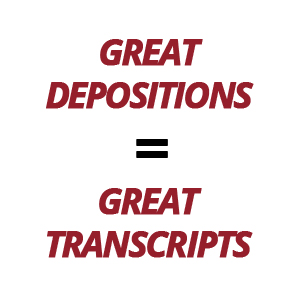 Any court reporter can tell you all attorneys are not alike, and neither is the way they take depositions! Given that there are a many strategies and approaches to getting answers to deposition questions, here are a few basic guidelines that will help you get a transcript that you can use:
Any court reporter can tell you all attorneys are not alike, and neither is the way they take depositions! Given that there are a many strategies and approaches to getting answers to deposition questions, here are a few basic guidelines that will help you get a transcript that you can use:
- Clarify your expectations with the court reporter ahead of time. Provide a copy of the deposition notice or complaint ahead of time. Let the reporter know before the deposition if you have a deadline looming. If interruptions drive you nuts, let the reporter know you’ll be happy to provide spellings afterwards and ask her not to interrupt unless it’s absolutely necessary. Provide the names of opposing counsel and their clients. If you like to ask the reporter to mark particular parts of the deposition, let her know you may say “Mark that,” so she is prepared.
- Understand that the court reporter is neutral. Even though you have hired the court reporter, she is obligated to be a neutral guardian of the record. Don’t expect her to follow your instructions over those of opposing counsel. Both sides must agree to go off the record, and the reporter will expect all parties to comply with the courtesy of one person speaking at a time.
- Excerpts. You may not want to order a transcript of an entire deposition, but you would like particular sections transcribed. If you organize your questions, this will enable the court reporter to identify the excerpts that you are looking for. Group questions about particular topics or issues together if possible.
- Enunciation and Diction. As court reporters, we all have attorneys that we enjoy working with — and one of the primary reasons is the way they speak. Our job is to listen, understand, and preserve the record. If we are constantly second-guessing what we heard, it makes for a long day. And if we can’t understand what you are saying, odds are the witness may not either!
- Slow and Steady. If you are looking at a full day of depositions, please don’t make it a race to the finish. We understand that sometimes an attorney may purposefully use a rapid-fire approach to questioning, and we love rising to the challenge, but we will not complain if the rapid-fire questions are interspersed with some slower exchanges.
- Don’t underestimate the power of silence! Don’t be too eager to ask your next question before the witness has had a chance to finish their last answer. Nature abhors a vacuum and as court reporters we have seen witnesses volunteer information simply because they weren’t cut off by the next question. And when you are defending a deposition, let your witness know they don’t have to keep talking just because no one else is!
- BREAKS — Take a break every couple of hours. The court reporter will appreciate it, and probably everyone else in the room will appreciate it as well!
In order to avoid last-minute deposition scheduling problems, download our Deposition Scheduling Report and Checklist.